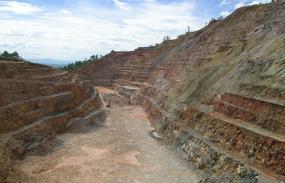The report, by the Justice and Corporate Accountability Project, documents 15 years of violence and death that happened near Canadian mines in Latin America.
A new report that documents 15 years of violence near Canadian mines in Latin America says the federal government is not doing enough to address the problem.
The study, published Monday, charts 44 deaths, 403 injuries and 709 arrests, detentions and charges from 2000-2015 that the authors link to 28 Canadian companies’ mining projects in 13 countries in the region.
“The world is taking notice of Canadian companies for all the wrong reasons,” said Shin Imai, a law professor at York University’s Osgoode Hall Law School and principal author of the report, titled The Canada Brand: Violence and Canadian Mining Companies in Latin America.
“We need a more robust way to hold companies accountable,” he said.
Pierre Gratton, president of the Mining Association of Canada, which represents several of Canada’s largest resource companies, said his members are committed to human rights and do disclose workplace injuries and fatalities in annual sustainability reporting.
Some Canadian companies work in “jurisdictions in which levels of violence are significantly higher, and respect for the rule of law lower, than that experienced in Canada, which is a challenge,” Gratton said. “Our members don’t condone violence nor, in many of these examples, is violence directly correlated to operations.”
Ottawa requires that Canadian mining companies follow voluntary corporate social responsibility (CSR) codes in their overseas activity. The office of the federal CSR counsellor also works to “reduce and constructively resolve” conflicts between local communities and Canadian companies. That office does not conduct investigations nor have the power to sanction companies.
Most companies subscribe to what is known as “voluntary principles on security and human rights,” Gratton said, a framework that requires companies to respect human rights, including in its dealings with police and security personnel.
The report, which was written by the Justice and Corporate Accountability Project, a legal aid group at Osgoode Hall, found 33 deaths, 57 injuries and 37 arrests, detentions and charges in the data set that were linked to the projects of publicly listed Canadian companies.
These cases cannot be independently verified by the Toronto Star.
Canadian securities regulations oblige companies to disclose events that may affect the market value of their shares. Incidents of violence may not necessarily meet that standard and no law requires companies to disclose all incidents that happen near their overseas projects.
In the documented cases, the companies disclosed just a quarter of deaths, and 12 per cent of injuries, the report says.
There is evidence that conflicts between mining projects and local comminutes can affect company stock price, according to a 2014 Harvard study.
Imai said the data in the new report raises questions about the correlation between violent conflict and Canadian mining companies in Latin America. “It is fair to inquire whether the company contributed to a community context where violence and criminalization could occur?”
Globally, Canada has been criticized for failing to develop better mechanisms to hold mining companies accountable for their overseas projects.
In April 2016, more than 180 organizations from Latin America sent an open letter to Prime Minister Justin Trudeau asking him to take action on problems at Canadian mines. Forty-one per cent of large mining companies operating in Latin America are Canadian.
Gratton said he supports strengthening Canada’s existing oversight system, but extending Canadian law to foreign jurisdictions is not workable. “Security, law and order and upholding respect for human rights remain the responsibility of government authorities,” he said.
Some of the violence recorded by researchers happened at anti-mining protests or appeared to target activists. Other cases affected community members, police, journalists or children. At least two security guards and six mine workers were among those killed, the report says.
Several Canadian mines are located in regions where drug cartels and organized crime are active. Mexico and Guatemala were among the countries with the highest levels of violence, with eight and 12 deaths respectively, the report found.
Link to the full report: https://justice-project.org/the-canada-brand-violence-and-canadian-mining-companies-in-latin-america/
